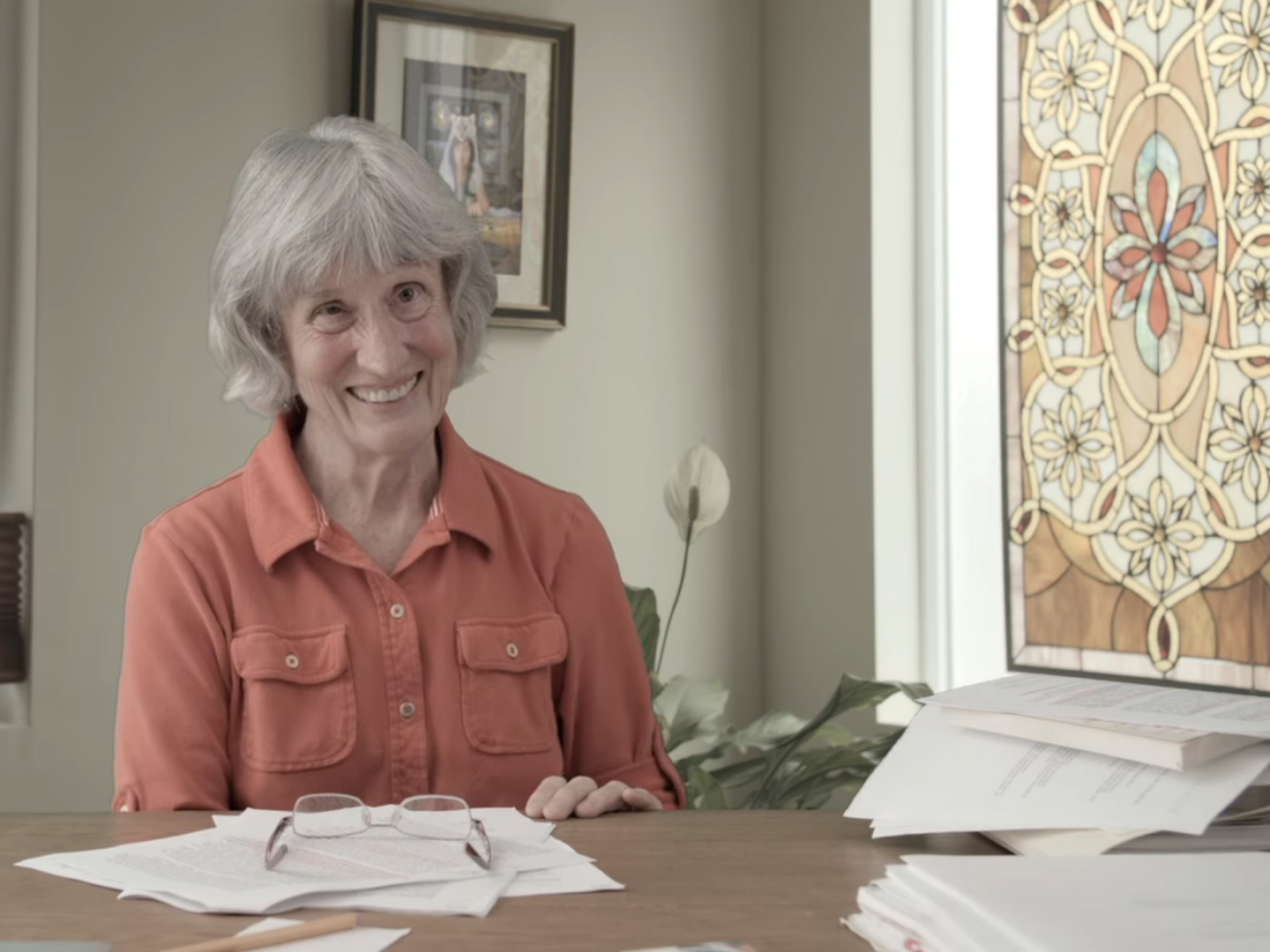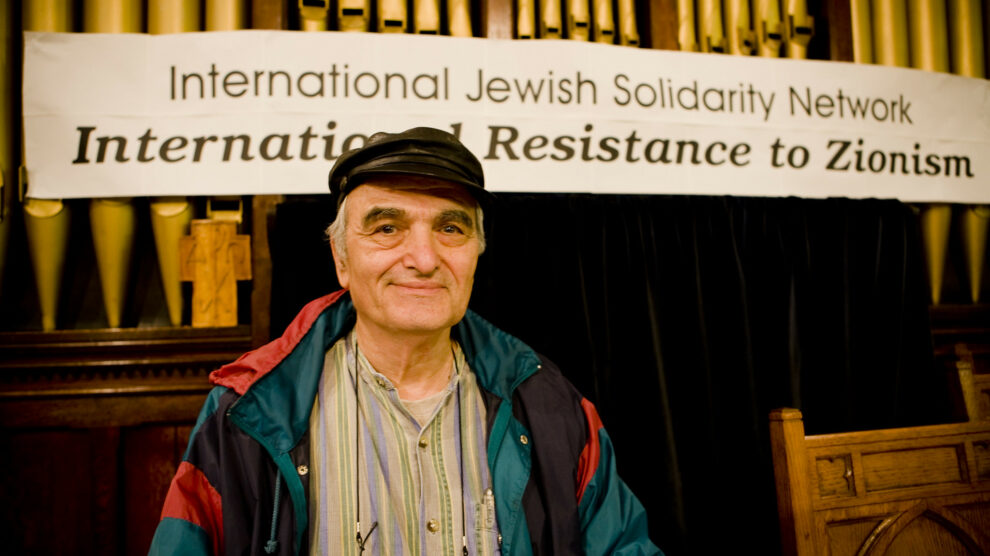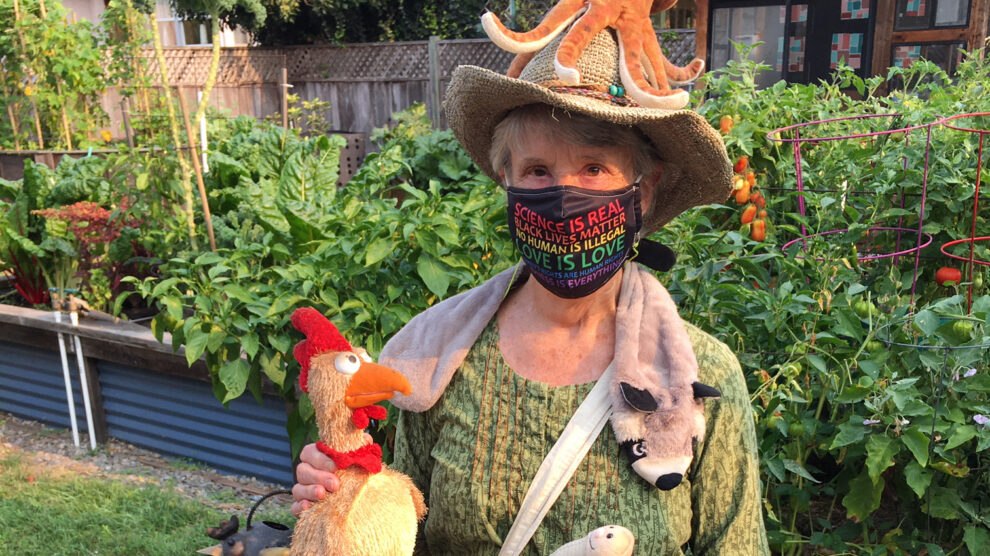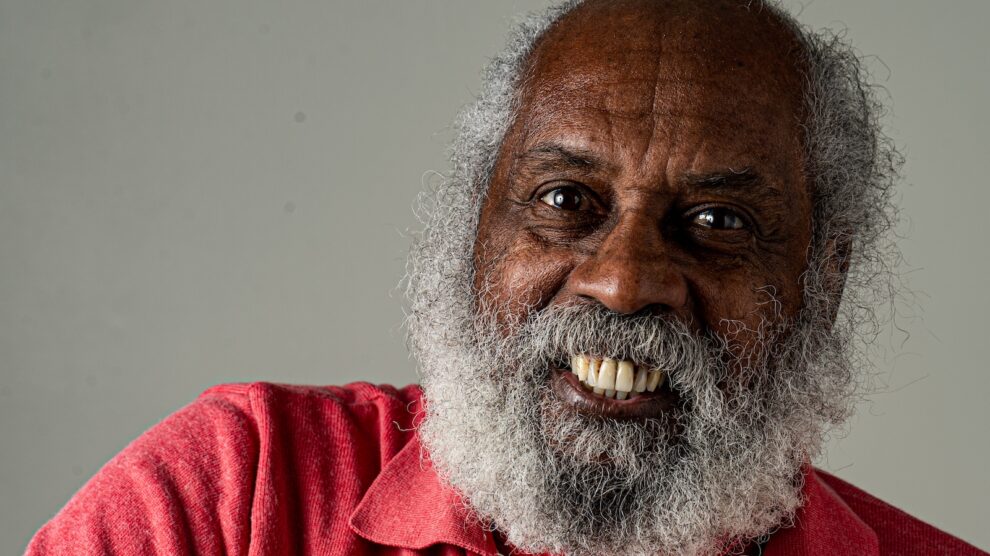Beyond Critique: An Interview with Donna Haraway
Part 2: A Biology for the People
By Katherine Bryant and Erik Wallenberg
Volume 23, number 3, Bio-Politics

Donna Haraway is Distinguished Professor Emerita in the History of Consciousness Department at the University of California, Santa Cruz. During her prolific career she has written dozens of books and articles bringing together intersecting fields of study including science, technology, feminism, climate change, and anthropology. In the summer of 2020, Katherine Bryant, secretary of Science for the People, and Erik Wallenberg, acquisitions editor at Science for the People, spoke with Haraway about the crises and rebellions of 2020, prospects for the future, and what we might learn from the history of past struggles. This interview has been edited for length and clarity.
This is the second part of a three-part interview with Dr. Haraway. You can read the first part here and the third part here.
Katherine Bryant: Dr. Haraway, we’re excited to be able to talk with you. Our current issue of the magazine is on the theme of Bio-Politics, and it’s being spearheaded by the working group that used to be called the Sociobiology Study Group, which I’m sure you’re familiar with.
Donna Haraway: [Laughter.] Part of my infancy!
KB: We’re discussing issues around biological determinism, but broadly, it’s about how science is misused and abused to reproduce colonialist, ableist, sexist, and racist ideologies, how to combat these problems, how people can use science towards liberatory ends. At the same time all of us are currently witnessing, and some of us are participating in, global uprisings against racism and colonialism. Can you talk about how your work interfaces with this, and your observations of the current moment that we’re seeing right now?
DH: I think we need each other’s sensibilities and each other’s work, but I’m always more interested in foregrounding, not so much the critique of the abuses, though I think a kind of deep historical and careful way of doing that remains fundamental. What I contribute, and what I long for, is a different kind of understanding of bio-politics, and I am allied in this with, for example, Bruno Latour, who has not been greatly beloved on the Left. His allergy to citing Marx is legendary [laughter]. Bruno is a dear friend of many decades now, and I am in love with his insistence, for example in his current work on critical zone scientists. He’s focused on people sited in a little forest out in northern France, where scientists and technologists come together to measure the history of water processes, mineral depositions, atmospheric and gas changes, the contemporary and deep history of this place on the earth. This is part of a strong commitment to not modeling at too big a scale, but modeling as earthlings from critical zones, in ways that can inform policy and science.
This isn’t biopolitics, exactly, although the questions of species interactions and ecological interactions play a role. These critical zone scientists have not been fundamentally oriented toward the biopolitics around racial injustice at all. Their work hardly addresses these major issues, but I think this is work that locates the sciences in and of the earth.
The history of racial science is not over, right? And the history of racial injustice is tied to biology and medicine, including statues to the gynecologist who forcibly operated on Black women in the history of slave times [J. Marion Sims], but it hardly ends there. These histories are really fundamental, but I think the temptation of people like us is to so concentrate on the abuses that we don’t recognize the importance of good biology for racial justice. Not just health—but certainly also health—but for understanding what healthy ecosystems look like, how they might be restored in alliance and collaboration. I think the absence of adequate understanding of developmental biology, pregnancy, and early childhood has racial impacts. And it may turn out to be that the most important biological intervention is good housing, with clean water, and that that’s actually a biological intervention. It may turn out—I mean it clearly does turn out—that while you really do want to know a lot of the details of cellular and molecular and developmental biology, what you most need to know is what conditions allow people to live pretty healthy lives, so these other questions have a different place. I don’t know if that’s an answer to the question, except that I’m always worried when the major thrust is critique of abuse.
KB: Can you say more about the Sociobiology Study Group?
DH: Yeah, sociobiology was a disaster. [laughter] It just makes me sad. I mean evolutionary biology is something to be in love with, right? Evolutionary ecological developmental biology, the symbiogenesis, the interplay between selection on one hand and symbiogenetic events on the other, the complexity and the composition of the earth and of Earthlings. It gets reduced frankly to a kind of cost-benefit, a really impoverished economic theory, straight out of the history of capitalist economics. It’s the reduction of Darwinism really. Darwinism was richer than that. Darwinism has never been the whole story in terms of explanatory apparatuses of advancing evolutionary theory, but I think it’s important. I couldn’t get through the day without thinking evolutionary thoughts.
I really love what Natasha Myers and Carla Hughstack did with involutionary momentum instead of evolutionary momentum. The coming together of the tissues of the earth to make new things. Sociobiology was, I think, cognitively damaged from the get-go, and was overwhelmingly—I can tell a cartoon version of this—pushed by very macho masculinist thinkers, who also did good things in the world. I think E. O. Wilson did some really important good things in the world. Sociobiology was not one of them. I feel like sociobiology proposed a fundamentally determinist and top-down economist-capitalist biology as if it were the latest shiny thing in evolutionary theory. And it did great damage, I think to biology, frankly, not to mention to the larger world. Those people were so arrogant because they thought they had mathematics, they had models, they had really fancy equations, and all the rest of it.
Again, think about E. O. Wilson for a minute. Here’s a man who was in despair over the dismantling of Natural History Museums, and the dismantling of on-the-ground Natural History taxonomists, who really knew the tissues of the world. Well, that kind of way of knowing the world is not going to be funded within the paradigms of that kind of a biological theory. On the other hand, I can think of lots of field biology that used evolutionary psychology, inheritors of sociobiology, as their explanatory models. A lot of good field biology got done in primate studies, in bird studies and so on, so you can’t be too simplistic about this. But I just feel like there were so many other resources for a much richer development, including the mathematics of evolutionary biology, and what happened was tragically narrow.
Erik Wallenberg: You gave a couple of examples of organizations or places where the dominant, capital “s” science, has been challenged. Can you give examples of any scientists or people practicing medicine, or institutions that you can point to who do the work of taking into account the social, and cultural, and political, and economic, next to the science, and really help us understand it?
DH: Michael Hadfield is a marine developmental embryologist biologist but has also worked on terrestrial Pacific Island land snail conservation, and in that context has worked consistently with Pacific Island allies from the various island nations and island groups in the Pacific. It has involved him in extremely interesting opposition to military and corporate development plans of various kinds, including on Pagan Island, where the Japanese wanted to dump so-called low-grade nuclear waste from their nuclear reactor fiasco. Michael and his allies basically blocked it, developed international publicity and petition drives, and also developed the science, did the surveys—what species are where and what kinds of legal tools can you use, therefore, to block something. Something as flawed as the Endangered Species Act is really important not to lose. You can deploy it. He and I wrote a thing about this called The Tree Snail Manifesto.
I think of Scott Gilbert’s major national textbook in developmental biology—one of the two or three major textbooks through which people are introduced to developmental biology in this country—and the degree to which Scott has, from the first edition, integrated the political and cultural and ethical, and religious concerns even. Scott is really interesting; he has very deep roots in Talmudic and in Jewish scholarship. He’s not observant particularly, but he has really interesting ways of thinking that have led him into certain kinds of ethical ways of thinking that are not Christian, which is really refreshing—not secular Christian either. His textbook writing in ecological and developmental biology, and his and his students’ and associates’ development of ways of thinking about the biological world refuses the program from above, the DNA, the dominance of the narrow sense of molecular biology, the foregrounding of the becoming with as a way of approaching the world—not just that we are in—but the world that we are of. We’re not in a container, so the knowledge making I think is really fundamental.
If you talk to some of the younger anthropologists who are deeply involved in science issues, people like Juno Parreñas, who has recently moved to Cornell; people like Tim Choi at Davis; people like Heather Swanson who’s now working in Denmark; Kim TallBear who is not an anthropologist—but who knows more than a little—and who’s the chair of Indigenous Studies in Alberta. If I were going to do some writing that foregrounded the ecology of what’s going on—[I would] talk to Natasha Meyers at York—really interesting stuff. If you talk to a lot of these folks, they know what’s going on on the ground, and with contemporary younger workers. These folks know and work with indigenous knowledge-makers. They are on the ground at the Tar Sands extractions in Alberta—these folks know both the strength of the opposition, including the scientific and technical opposition, and the commitment of folks who are doing the work really trying to make a difference.
EW: Some of the people who read the magazine will also be interested to hear about your relationship to Science for the People. You always say you’re thinking of “the people,” not just as humans, but rather thinking of the broader world, the other critters, the whole ecology—
DH: All of us.
EW: —yes, the whole earthly system. I just wonder if you might talk a little bit about your connection to Science for the People and other radical science groups? How you have navigated that world over time, and any lessons or things that we can draw from that.
DH: Science for the People was important to me when I was a biology graduate student at Yale. That’s when the organization first entered my world. But I think my understanding of the relation of science and politics goes back a lot longer than that, and in many ways goes back to high school: taking biology in high school and finding out that as a believing and practicing Catholic kid in a Catholic school, learning evolution was fraught. It wasn’t just something I could learn and not have to integrate into other and conflicting ways of being in the world that were in friction with that, if not absolutely opposed. That way of taking in Sciences from the get-go as a kind of friction, a kind of development of a way of thinking about the world, goes back really a long time for me and developed further in the civil rights movement for sure. The population bomb stuff was a big problem for me from the get go. In the end I became a zoology major in college because of a lecture by Barry Commoner on environmental issues.
Science for the People as an organization very much related to the Vietnam War—chemical and biological warfare. As a biology graduate student at Yale, I was a TA in a course taught by a faculty member opposing chemical and biological warfare. It was part of the biology curriculum at Yale in that period. The graduate students in my cohort were organized as feminists. Many of those women went on to form the feminist associations in the society of cell biology and developmental biology, the Boston Women’s Health Collective, and so on. The gay liberation movement was very much part of that and the whole question of the genetics or not of gay and lesbian ways of being in the world—these questions of the relationship of the sciences to being in the world of which Science for the People as an organization was a big part in those years.
I was beginning to understand the history of sterilization abuse in Puerto Rico and that any kind of feminist reproductive politics had to take account of class and race, big time. I was part of the Take Back the Night marches and the Marxist feminist organization in Baltimore when I taught at Johns Hopkins. So Science for the People as an organization was a piece of this broader fabric. That was true pretty much for all of us. I taught from the magazine in my classes early on. I was never a key activist in Science for the People but I was a member and a fellow traveler and it was part of the world that made sense to me.
I think part of the job of Science for the People is to make the joy of science available to the people. We critique science for sure. But I think communicating the “Wow,” the really fantastic beauty of it all, that we’re for. Otherwise, why bother with the critique? We have to remember why we’re doing it, which is for this world that is at stake. If not, despair is just around the corner—especially now when the trouble is so profound.
KB and EW: Thank you for taking the time to talk with us. We hope you, and all of us, will be able to stay away from the overwhelming.
About the Authors
Katherine Bryant, PhD, is the Secretary of Science for the People, member of the Biology and Society Working Group, and a postdoctoral fellow at the Wellcome Centre for Integrative Neuroimaging at the University of Oxford. During her PhD, she helped organize undergraduates, graduate students, and faculty to fight against austerity measures implemented by the university administration. In addition to conducting research on the evolution of the human brain, she works to promote the work of feminist neuroscientists through the Neurogenderings group, and to support and advance the work of Science for the People.
- Twitter: @evoneuro
- Instagram: @katsqwerl
- Facebook: /katherinelbryant
Donna Haraway, PhD, is Distinguished Professor Emerita in the History of Consciousness Department at the University of California, Santa Cruz. She earned her PhD in Biology at Yale and writes and teaches in science and technology studies, feminist theory, and multispecies studies. At UCSC, she is an active participant in the Science and Justice Research Center and Center for Creative Ecologies. Haraway’s work explores the string figures composed by science fact, science fiction, speculative feminism, speculative fabulation, science and technology studies, and multispecies worlding. She is the author of several books including Staying with the Trouble: Making Kin in the Chthulucene.
Erik Wallenberg is a PhD candidate in the History Program at CUNY Graduate Center. His research is focused on the portrayal of environmental crises, politics, and science in activist theater. He has taught classes in environmental history, global history, and environmental justice at Brooklyn College and the University of Vermont and is Acquisitions Editor at Science for the People.





